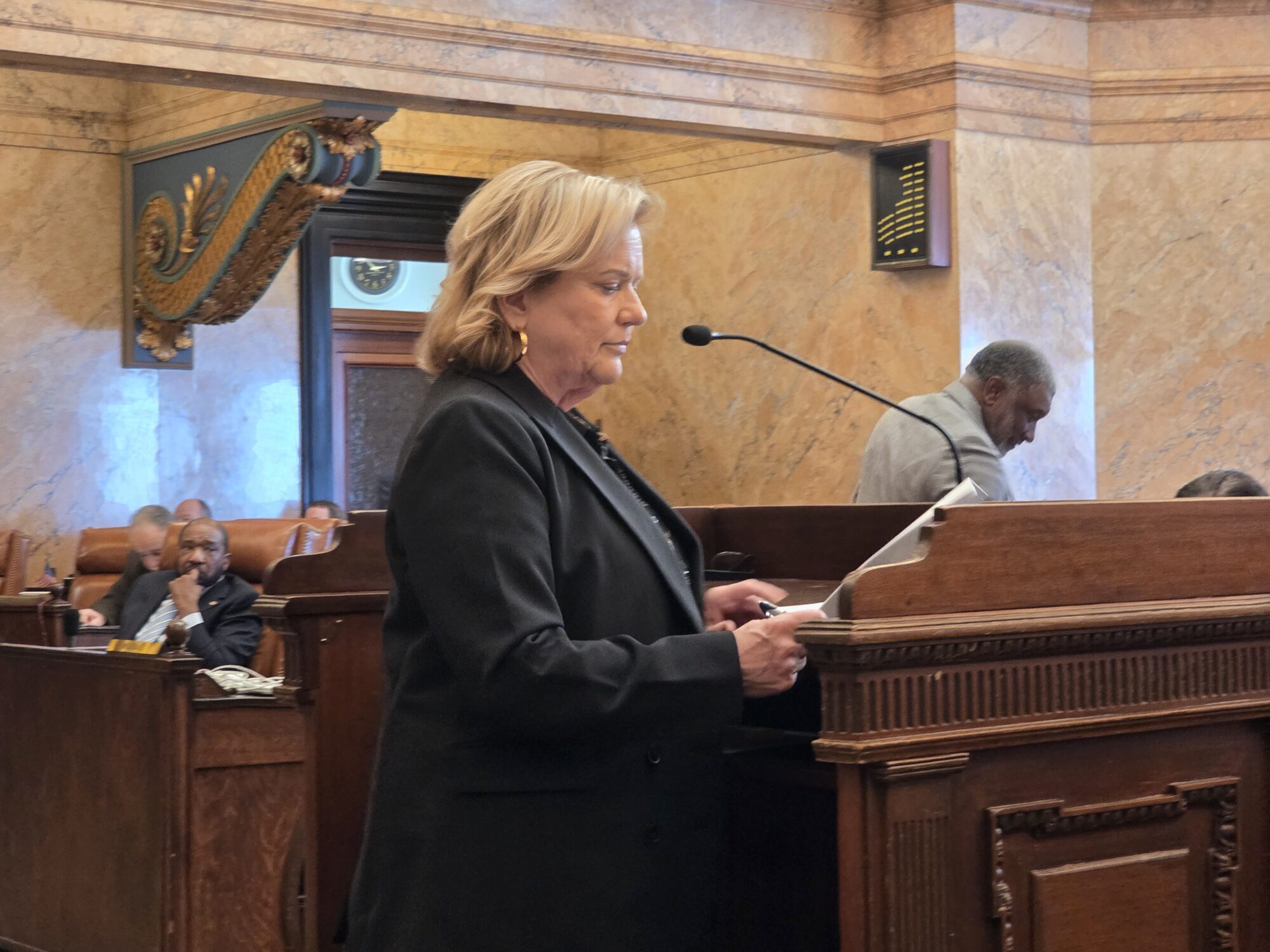State Health Officer concerned with Mississippi’s mortality rate

Mississippi State Health Officer Dr. Daniel Edney, addresses members of the Mississippi Joint Legislative Budget Committee during his budget presentation for the state Department of Health, Friday, Sept. 29, 2023, in Jackson, Miss. (AP Photo/Rogelio V. Solis)
- Dr. Daniel Edney recently told lawmakers that while he’s concerned with Mississippians’ life expectancy, there are bright spots in the state, such as a decline in infant deaths.
Factors leading to a shorter than average life expectancy in Mississippi are affecting the state’s population numbers. That was the message Dr. Daniel Edney delivered to the state Senate’s Study Group on Women Children and Families recently.
The State Health Officer told lawmakers that while there are bright spots, more work is needed to offset the negative factors affecting the health of Mississippians.
Currently, the average life span for Mississippians is about 71.9 years, well less than that of Hawaii’s average of 80 years. Within the Delta, life expectancy drops to about 68 years.
“We as Mississippians deserve to live longer like the rest of the country and to live healthier like the rest of the country,” Edney said.
The Centers for Disease Control and Prevention released a report in 2022 showing the national average life expectancy during 2020 was 77 years. Within the southern region, only Florida stood out with a higher life expectancy than the national average, ranging from 76.9 to 78 years. Texas and Georgia had a life expectancy rates slightly above Mississippi’s, between 75.4 to 76.8 years.
The state’s mortality rate affects the state’s population numbers, Dr. Edney said. Estimates show if Mississippi had average mortality rates for all causes of death going back as far back as the 1950s, an additional 215,000 people would be alive today.
“This is not potential lives, this is real lives,” Edney emphasized to lawmakers. “I can’t say they’d still be in Mississippi. They may have well moved to Alabama if they had lived, but because we are where we are with mortality they did not survive.”
To further drive the point home, Edney added that since the mortality rate includes children who did not live long enough to have families, the potential population increase could have totaled closer to 400,000.
“Four hundred thousand people who are not alive, some who never had a chance to exist because it was related to an infant death who never had a chance to reproduce. But a lot of these deaths are very preventable deaths,” Edney said. “I mean y’all do realize we could have a fifth congressional district if we just had average health, average. Not super great health, just average.”
One of the factors affecting infant mortality is the practice of parents co-sleeping with their infants, which can result in Sudden Infant Death Syndrome. Dr. Edney said the state has to do more to convince parents and caregivers to avoid that scenario. Placing a sleeping infant on its back in its own bed makes a tremendous difference in reducing SIDS, Edney added.
There is evidence to support Edney’s recommendation. Reviews of infant death certificates found high enough rates of asphyxia or suffocation being listed as the cause to prompt calls for infants to be placed in separate beds, according to a report shared by the National Institute of Health’s National Library of Medicine.
“The association of these adverse outcomes with bedsharing practices prompted the CPSC (Consumer Product Safety Commission) in 1999 to recommend that the only safe place for babies to sleep is in a crib that meets current safety standards,” the report states.
The bright spot Edney, as described in relation to infant mortality, is the current downward trend within Mississippi. An infant death is defined as the death of a child before their first birthday.
During the last decade, the average annual number of infant deaths in Mississippi was about 320. Last year that number fell to 306.
Dr. Edney said that as of November of this year there have been 182 reported infant deaths.
Still, he’s concerned about the state’s continued decline in births, people moving to other states for job opportunities, and the dropping life expectancy rate.
“So, we do have a brain drain issue, but y’all we have a lot of other drain going on that relates to health and one thing I’ve been saying, it’s not just brains moving to Nashville, it’s brains going into the ground,” Edney said.
According to the CDC, Mississippi led the nation in 2022 in infant mortality per 1,000 live births at 9.11. The state with the lowest infant mortality rate was Massachusetts at 3.32 per 1,000 live births that same year.











